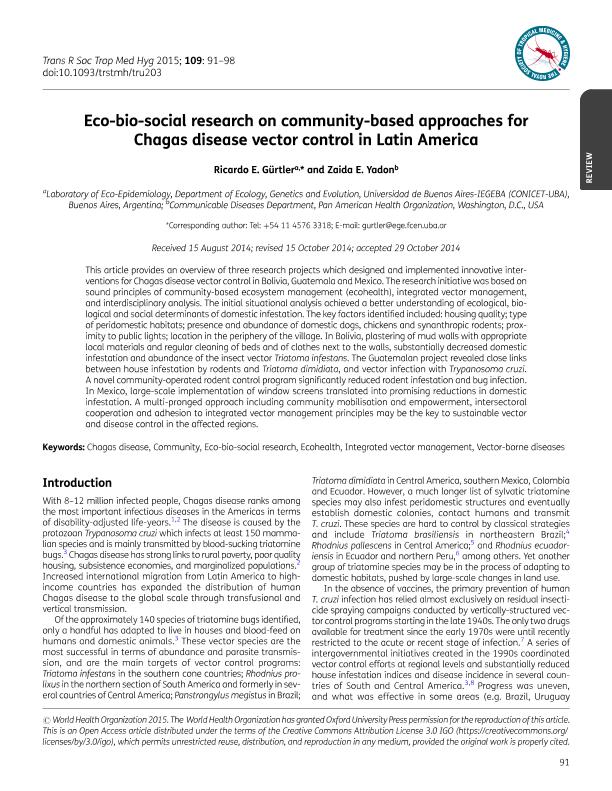Mostrar el registro sencillo del ítem
dc.contributor.author
Gurtler, Ricardo Esteban

dc.contributor.author
Yadón, Zaida E.

dc.date.available
2017-07-05T18:56:30Z
dc.date.issued
2015-01
dc.identifier.citation
Gurtler, Ricardo Esteban; Yadón, Zaida E.; Eco-bio-social research on community-based approaches for Chagas disease vector control in Latin America; Oxford University Press; Transactions of the Royal Society of Tropical Medicine and Hygiene; 109; 2; 1-2015; 91-98
dc.identifier.issn
0035-9203
dc.identifier.uri
http://hdl.handle.net/11336/19631
dc.description.abstract
This article provides an overview of three research projects which designed and implemented innovative interventions for Chagas disease vector control in Bolivia, Guatemala and Mexico. The research initiative was based on sound principles of community-based ecosystem management (ecohealth), integrated vector management, and interdisciplinary analysis. The initial situational analysis achieved a better understanding of ecological, biological and social determinants of domestic infestation. The key factors identified included: housing quality; type of peridomestic habitats; presence and abundance of domestic dogs, chickens and synanthropic rodents; proximity to public lights; location in the periphery of the village. In Bolivia, plastering of mud walls with appropriate local materials and regular cleaning of beds and of clothes next to the walls, substantially decreased domestic infestation and abundance of the insect vector Triatoma infestans. The Guatemalan project revealed close links between house infestation by rodents and Triatoma dimidiata, and vector infection with Trypanosoma cruzi. A novel community-operated rodent control program significantly reduced rodent infestation and bug infection. In Mexico, large-scale implementation of window screens translated into promising reductions in domestic infestation. A multi-pronged approach including community mobilisation and empowerment, intersectoral cooperation and adhesion to integrated vector management principles may be the key to sustainable vector and disease control in the affected regions.
dc.format
application/pdf
dc.language.iso
eng
dc.publisher
Oxford University Press

dc.rights
info:eu-repo/semantics/openAccess
dc.rights.uri
https://creativecommons.org/licenses/by-nc-sa/2.5/ar/
dc.subject
Chagas Disease
dc.subject
Vector Control
dc.subject
Eco-Bio-Social Factors
dc.subject
Intervention
dc.subject.classification
Ecología

dc.subject.classification
Ciencias Biológicas

dc.subject.classification
CIENCIAS NATURALES Y EXACTAS

dc.title
Eco-bio-social research on community-based approaches for Chagas disease vector control in Latin America
dc.type
info:eu-repo/semantics/article
dc.type
info:ar-repo/semantics/artículo
dc.type
info:eu-repo/semantics/publishedVersion
dc.date.updated
2017-07-05T15:02:40Z
dc.identifier.eissn
1878-3503
dc.journal.volume
109
dc.journal.number
2
dc.journal.pagination
91-98
dc.journal.pais
Reino Unido

dc.journal.ciudad
Oxford
dc.description.fil
Fil: Gurtler, Ricardo Esteban. Consejo Nacional de Investigaciones Científicas y Técnicas. Oficina de Coordinación Administrativa Ciudad Universitaria. Instituto de Ecología, Genética y Evolución de Buenos Aires. Universidad de Buenos Aires. Facultad de Ciencias Exactas y Naturales. Instituto de Ecología, Genética y Evolución de Buenos Aires; Argentina
dc.description.fil
Fil: Yadón, Zaida E.. Pan American Health Organization; Estados Unidos
dc.journal.title
Transactions of the Royal Society of Tropical Medicine and Hygiene

dc.relation.alternativeid
info:eu-repo/semantics/altIdentifier/doi/http://dx.doi.org/10.1093/trstmh/tru203
dc.relation.alternativeid
info:eu-repo/semantics/altIdentifier/url/https://academic.oup.com/trstmh/article-lookup/doi/10.1093/trstmh/tru203
dc.relation.alternativeid
info:eu-repo/semantics/altIdentifier/url/https://www.ncbi.nlm.nih.gov/pmc/articles/PMC4299528/
Archivos asociados
